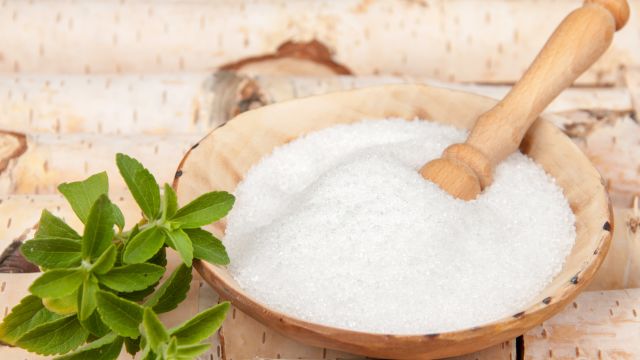Evidence on the detrimental effects of added sugar on our health is mounting. We now know that over-consumption of added sugar impacts the heart, liver, pancreas, brain and belly. But there’s good news for those who still want to satisfy a sweet tooth. Scientists are finding that stevia, derived from a South American shrub, not only replaces sugar, but can have positive effects on your health.
A March 2017 study published in the journal Nature suggests that the benefits of stevia for diabetes and blood sugar management go beyond reducing calories. Researchers from the United Kingdom and Belgium have discovered that stevia activates a protein called TRPM5. TRPM5 plays a role in the release of insulin, helping to manage our blood sugar after eating. Stevia may not just be an excellent way to combat overuse of sugar; it may actually promote health and well-being.
Here we concentrate on the upsides of one particular sweetening agent, giving you five reasons to feature stevia in your dessert menu.
1. Blood Sugar Balancing
A position paper on nutritive and non-nutritive sweeteners from the Academy of Nutrition and Dietetics reviewed five randomized controlled trials examining the effects of stevia compared with placebo on metabolic outcomes. In one study showing minimal effects, subjects with Type 2 Diabetes reported reduced postprandial blood glucose and glucagon (a blood-sugar-regulating hormone) response after a test meal of stevia versus placebo.
2. Naturally Derived
Stevia is a plant native to South America that’s been used by indigenous people for 200 years, observed by western scientists for over 100, and cultivated for larger-scale use for more than 40. Its leaves are naturally sweet and contain different sweet-tasting components called steviol glycosides. Each of these steviol glycosides has its own unique taste profile and sweetness intensity. Each can be anywhere from 200 to 350 times sweeter than sugar—without the calories. Which is why stevia has become a popular replacement for sugar and other sweeteners.
3. Zero Calories
You didn’t miss the phrase “without the calories,” did you? It bears repeating: steviol glycosides have zero calories. Stevia-based tabletop sweeteners can have zero or minimal calories per serving, depending upon the other food ingredients with which they are combined. Needless to say, these stevia-enriched foods’ calorie profiles could have a positive effect on those looking to control weight or manage diabetes.
4. Safe
Those who grew up with suspicions of the artificiality of saccharin and aspartame packets at their local diner may be wary of the idea of another sugar “substitute”. Fear not: leading organizations such as The Academy of Nutrition and Dietetics, The American Diabetes Association, The American Heart Association, and The Institute of Food Science and Technology support the safety and benefits of naturally sourced, zero-calorie stevia (as well as other low-calorie sweeteners). More than 200 studies have researched stevia’s relationship to a variety of health concerns, including diabetes, allergies and cancer. Multiple entities have determined high-purity stevia leaf extract to be safe for consumption by children, adults and special populations. The US Food and Drug Administration has given it the “Generally Recognized as Safe” label.
5. Easy to Use
At up to 350 times the sweetness of sugar, stevia certainly does not take up much space. This makes it easy to store and carry, though it may create challenges in the baking sphere. It’s found in both liquid and powdered form, and sometimes in packets. Liquid stevia even comes in flavors such as lemon, caramel and chocolate. As a sugar replacement, two to three teaspoons of powdered stevia or one teaspoon of liquid can replace one cup of sugar.
Did I say chocolate? You can enjoy the delicious, decadent Ornish Kitchen Chocolate Pudding with Raspberries (go to “Menu 2,” and scroll to the bottom of the page) that minimizes the added sugars by adding stevia and less maple syrup. Or try adding a few drops of chocolate-flavored stevia into a cup of nonfat Greek yogurt to perk up your breakfast and jumpstart your day.
Learn about the importance of limiting added sugars in the Ornish Living article Not All Sweeteners Are Created Equal.
Originally published on Ornish Living.






